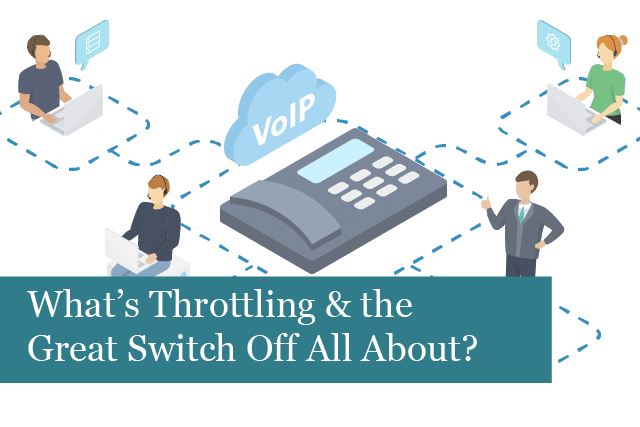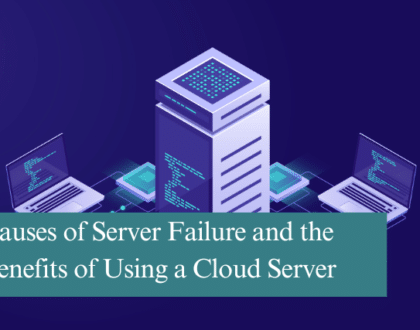
You may have heard about throttling and the great switch off! What is this all about, anyway? All of this has to do with the impending shutdown of analogue phone services (PSTN and ISDN). Phone services will be switched over to VOIP-based telephone services instead.
While some see this process as nothing but a problem, the switch is necessary. The old network was built of copper fibre, which is costly and challenging to maintain. However, the newer services will be more compatible with more modern communication methods.
During this process, broadband speeds will be throttled (slowed) and phone calls will be limited. The process is meant to get customers to change over to the new network. The benefits of the new system will far outweigh any issues that go with making the change from the old to the new network.
Some of the benefits customers can look forward to include more flexible, reliable, scalable, and secure communication services that keep up with our digitised world.
What is the Great Switch Off?
The great switch off refers to making the switch from the old copper phone network to the new digital voice network. The change was first announced back in April 2021 by BT Openreach. They announced that the great switch off would last from the end of that year to the end of 2025. During this period, 15 million lines would be moved, though some say the actual figure is closer to 29 million home landlines) from analog to VOIP (Voice Over Internet Protocol).
This means that the Internet (broadband) services will be used to digitally carry phone calls rather than the older copper wire network. All landline calls will be transmitted digitally. In each home, people will plug in a new digital phone (powered by mains electricity) into their router rather than a phone socket in the wall.
Also the End of ISDN
The great switch off of the UK’s traditional public switched telephone network (PSTN) also means the end of ISDN. The reason for this is because ISDN also relies on the old copper network.
All of this means that BT Openreach will not be accepting new orders for PSTN, ISDN2, and ISDN30 services after September 2023.
Why?
The old PSTN service is nearing the end of its life. It is increasingly challenging and expensive to maintain. For these reasons, Openreach is looking to leave the legacy copper network behind. Paying for two parallel networks would just be too costly.
In addition, new technology means there are better alternatives that are compatible with the way most people communicate today through mobile and Internet communications. Customers will also experience the following advances in the change to VOIP services:
- VOIP services offer greater bandwidth capacity
- Cost savings and fewer system failures and outages, along with reduced complexity for providers
- Scalability and portability (VOIP phone systems can go wherever the company goes)
- Greater communications mobility, flexibility, and increased productivity and collaboration
- Better security that’s continuously updated
- Greater reliability
- Improved customer experiences
- Clearer calls, making it easier to keep existing numbers and having the choice to access broadband separately from the phone service
- Better identification and prevention of nuisance calls, saving businesses time and money, while potentially protecting against scammers
What is “Throttling?”
Throttling is the process of intentionally slowing down Internet speeds by an ISP (Internet Service Provider) during certain times or for certain types of online activities. Openreach intends to encourage customers to leave their analog phone services by contacting their providers and upgrading to newer digital alternatives.
Nudging
A small number of customers have not yet upgraded their services in spite of attempts by the ISPs to contact them. So, some “gentle measures” are being used to “nudge” these customers to contact their service providers for an upgrade.
Essential Deadlines
Openreach notified its Communications Providers (CP) customers in January last year that their analog services would be ended in trial areas by 19 April 2023; however, the deadline has been extended to October 9 this year to test the new services.
For anyone remaining on the legacy network who has not agreed to an exemption, Openreach will introduce a reduction in broadband download speeds to around 2Mbps from April 24. After this date, the company will bar outbound calls from June 5. The changes will come in batches to better manage customer responses.
Openreach says they’re still on track for the UK to make the switch off by the end of 2025.
How Can Your Business Prepare for the Great Switch Off?
Now is the time for your business to prepare for the great switch off. That means it’s necessary that you make the switch from ISDN to VOIP phone systems.
Your business may want to consider some alternative communication methods, including the following:
Non-Hosted VOIP: VOIP relies on an established Internet connection to make calls via IP networks. This system can be integrated into businesses by using desktop and mobile devices. Non-hosted VOIP service can allow your company to be in control of its service, though you will be responsible for repairs and maintenance.
Cloud-based VOIP Systems: another option is to invest in cloud-based VOIP systems, which rely on Internet connections for communications. Your company won’t have to take care of maintenance and repairs, as providers take care of these issues, along with the initial setup.
Mobile Phones: your business may already be relying on mobile phones for essential communications and these services will continue to be available. However, it may mean that employees need to carry two or more mobile phones. Even so, it’s possible to find a wide range of packages and deals for your business.
Your business can prepare for the switch off by:
- Finding out when your current contract for landline services ends or renews—the perfect time to make the change to alternative services.
- Check if you’ll need new equipment for the alternative service you choose or whether what you already have can be updated.
- Research service providers for the alternative services you’ve chosen; once you’ve found the right provider, contact them to get everything set up.
The Benefits for Your Business with the Big Switch Off
It’s true that the big switch off means many changes, but there are also plenty of benefits for your business, too, including:
- Reduced costs
- Increased speed and reliability
- Improved collaboration
- Wider range of call features
- And more
Summing It Up
The great switch off will be finished by 2025! That’s not far away! Now is the time for your company to prepare for the switch off to avoid negative impacts to your business.
Recommended Posts

10 Biggest Cybersecurity Mistakes of Small Companies
18th April 2025

The Importance of Planning in Business IT Solutions
11th April 2025

